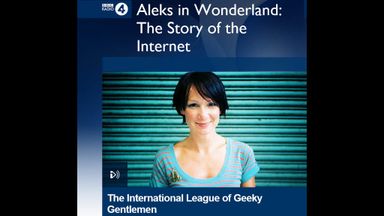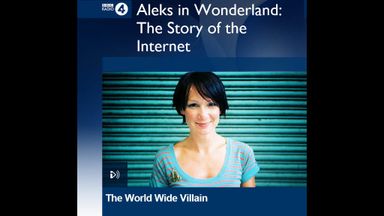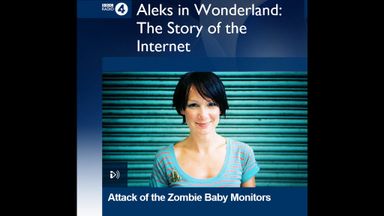Aleks in Wonderland: The Story of the Internet
3. Attack of the Zombie Baby Monitors
Clips from this programme
Introduction: Safety laws to lessen Road Accidents via available solutions (Billy Blunders, Ralph Nader author of "Unsafe at any speed"). Use of technological fixes to regulate the internet possible, or is a more political approach to governance of this vital but flawed communications medium needed, Ethical designs (Isaac Asimov's I, Robot) (Aleks Krotoski )
Duration: 03:57Technological Myths: Removal of Social Media accounts used for ill (August 2011 riots, David Cameron) would not work by the nature of the Internet. E.g. Chinese Media is ring-fenced, a disconnected web costing 2 million professionals to manage this, but ineffective. Miles Kwok on YouTube seen through the Chinese Great Firewall, VPNs
Duration: 07:26Chinese need to access beyond Virtual Private Networks (VPNs) and these also allow Chinese access to Social Media like Facebook, Twitter, Instagram & YouTube as if they are outside China's firewalls, business and individuals. Miles Kwok uses the internet to work around national blocks
Duration: 02:36Fix the Internet?: Fixing the control flaws in the current internet would be extremely difficult (Ben Hammersley), fixing the internet applications to have no security shortcomings (Howard Shrobe, Principal Research Scientist, MIT Computer Science and Artificial Intelligence (AI) Laboratory), C++ fixes impossible. Data-breach fines will encourage better software
Duration: 04:04Internet Security lessons learnt from health issues many starting from a single infection (Ebola). Malicious code spread, Virus spread. NHS Cyber-attack, ransomware. Prevention
Duration: 03:31Smart Home devices: IoT (Internet of Things), new applications with insufficient security (Texting fire-alarm, smart fridges, communicating light bulbs, cctv cameras) can be hacked for ill on the internet (Howard Shrobe). Default Passwords to avoid Botnets (Dame Wendy Hall)
Duration: 05:03Conclusions: Responsibility for our safety in the digital world relies on us
Duration: 01:11Aleks in Wonderland: The Story of the Internet
1. The International League of Geeky Gentlemen
First broadcast: 16th August 2017
Duration 27:53
Just how did the Internet become the most powerful communications medium on the planet, and why does it seem to be an uncontrollable medium for good and bad? With no cross border regulation the internet can act as an incredible force for connecting people and supporting human rights and yet at the same time convey the most offensive material imaginable. It has become the most useful research tool on earth but also the most effective way of delivering threats to the security of governments, the health service and on a personal level our own identities. In this series Aleks Krotoski unravels the complexity of the internet, meeting the people who really invented it, looking behind the myths and cultural constructs to explain what it actually is and how it came to exist outside of conventional regulation. We'll ask whether the nature of the net itself really is cause for concern - and if so what can be done to reign in the negatives of the internet without restricting the positives? In this first episode we go back to the days before the internet to look at the cultural and technological landscape from which it grew, and unravel some of the key moments - now lost in time and obscured by technology folklore, which mark when the internet lost its innocence.
2. The World Wide Villain
First broadcast: 23rd August 2017
Duration 28:04
With the coming of the World Wide Web in the 1990s internet access opened up to everybody, it was no longer the preserve of academics and computer hobbyists. Already prior to the web, the burgeoning internet user groups and chatrooms had tested what was acceptable behaviour online, but access was still limited. Aleks Krotoski asks whether the Web through enabling much wider use of the internet is the villain of the piece in facilitating not just entertainment and commerce, but all aspects of the darker side, from malicious computer hacking attacks, worms and viruses, to new channels for criminality, online extortion and identity theft.
3. Attack of the Zombie Baby Monitors
First broadcast: 30th August 2017
Duration 27:56
Can we Control the Dark Side of the Internet?The Internet is the world's most widely used communications tool. It's a fast and efficient way of delivering information. However it is also quite dumb, neutral, treating equally all the data it passes around the world. From data that forms scientific research papers, the wealth of social media to keep us all connected with friends and relatives, entertainment or material we would rather not see- from political propaganda to horrific violence, the Internet makes no distinction. Is it time to change that? And can we? In this programme Aleks Krotoski looks at whether it's possible to use technological fixes to regulate the internet or whether a more political approach is needed to governance of this vital but flawed communications medium
Now playing










